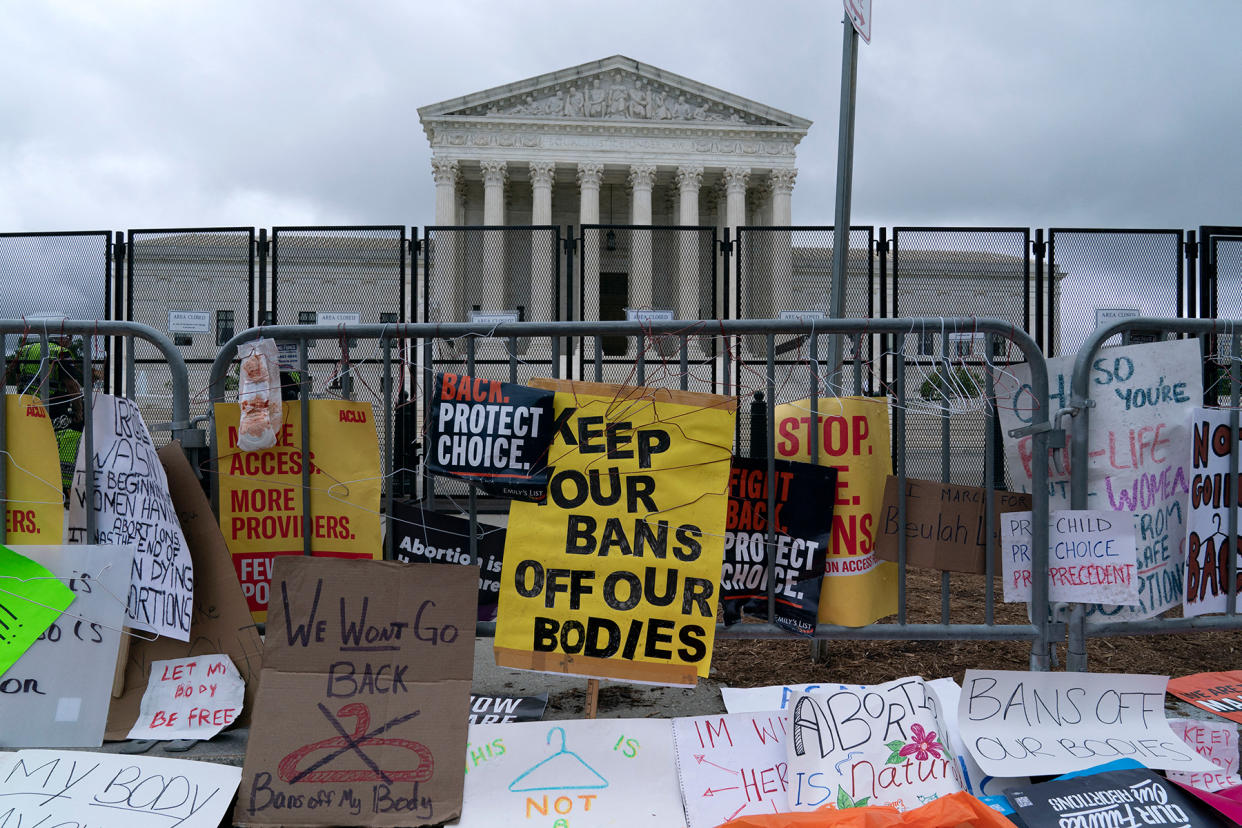Roe v. Wade Is Officially Dead

- Oops!Something went wrong.Please try again later.
Roe v. Wade is dead.
The Supreme Court on Friday ruled 6-3 that states can restrict or outright ban abortion at any point during a pregnancy, overturning the landmark 1973 decision that enshrined abortion protections in federal law, along with a subsequent decision that affirmed those protections in 1991. “Roe and [Planned Parenthood v.] Casey must be overruled,” Justice Samuel Alito declared. “It is time to heed the Constitution and return the issue of abortion to the people’s elected representatives.”
More from Rolling Stone
Trump Pauses Self-Obsession To Acknowledge His Role in Taking Rights from Millions of Women
Olivia Rodrigo Sings 'Fuck You' to Supreme Court Justices at Glastonbury
Ban Abortion Pills, Prosecute Planned Parenthood: This Is The Future Republicans Want
The ruling in Dobbs v. Jackson Women’s Health Organization, a case that concerned the constitutionality of a 15-week abortion ban in Mississippi, represents a massive victory for conservatives who have sought for decades to reverse the court’s 1973 decision — and a cataclysmic event for anyone who believes in bodily autonomy. Public polling indicates the latter outnumber the former, nearly 2 to 1.
Justices Breyer, Sotomayor and Kagan registered their disapproval of the majority’s decision, writing, ‘”With sorrow — for this Court, but more, for the many millions of American women who have today lost a fundamental constitutional protection — we dissent.”
Twenty-six states are now poised to ban abortion in short order, including 13 states with “trigger bans” on the books — laws that automatically ban abortion in the event Roe is struck down, as it was today. Planned Parenthood estimates that some 36 million people — roughly half the women of reproductive age in America — live in states that will be affected.
The leak of the draft opinion making the court’s intentions clear sparked national outrage and a failed push by Democrats in Congress to pass a law protecting abortion access across the country. It contained controversial arguments advanced by Clarence Thomas (that abortion is a form of eugenics intended to suppress the black population) and Matthew Hale, a 17th Century British legal scholar who defended marital rape. The opinion is unequivocal in its repudiation of Roe, describing the ruling as “egregiously wrong from the start.” Those citations remained in the final decision published on Friday.
The court’s decision opens the door for states to regulate access to abortion as they see fit. Practically speaking, this mean access to reproductive health services is likely to be severely curtailed in Alabama, Arizona, Arkansas, Georgia, Idaho, Iowa, Kentucky, Louisiana, Michigan, Mississippi, Missouri, North Dakota, Ohio, Oklahoma, South Carolina, South Dakota, Tennessee, Texas, Utah, West Virginia, Wisconsin, Wyoming. Nine of those states have laws on the books banning abortion that pre-date Roe, 15 have passed bans were previously unconstitutional under Roe, 13 have trigger bans, and four have amendments to their state constitutions banning abortion protections. Many of them have more than one of the above. The Guttmacher Institute, a nonprofit research organization, considers four additional states — Florida, Indiana, Montana, Nebraska — “likely” to ban abortion based on their political composition and recent efforts to restrict the practice.
The end of Roe is the culmination of a decades-long conservative crusade that originated with evangelical Christians opposed to desegregation, gained steam as the Republican Party embraced the Christian right during the Reagan era, and found new momentum with the push to pack the Supreme Court with arch-conseervative justices like Alito.
In only four years in office, and with the help of one particularly gullible pro-choice Republican, former President Donald Trump was able to appoint three such justices. They all voted to strike down Roe, signally, unequivocally, the bitter end of the Supreme Court’s legitimacy as a dispassionate, non-partisan branch of government, and ushering in a new era in which no right can be considered safe, and no judicial precedent sacred
And with the demise of a bedrock precedent like Roe, other fundamental rights are now squarely on the chopping block as well. The court’s three liberal justices warned in their dissent that the majority’s “cavalier” attitude toward decisions once considered settled “places in jeopardy other rights, from contraception to same-sex intimacy and marriage.” On cue, in solo concurring opinion, Justice Clarence Thomas wrote that the court should reconsider protections on contraception, same-sex relationships, and same-sex marriage next.
Best of Rolling Stone

